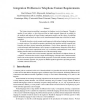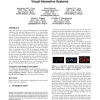155 search results - page 5 / 31 » Evaluation of a State-Based Model of Feature Interactions |
105
Voted
UM
2007
Springer
15 years 6 months ago
2007
Springer
Accurately recognizing users’ affective states could contribute to more productive and enjoyable interactions, particularly for task-oriented learning environments. In addition t...
92
Voted
GECCO
2005
Springer
15 years 6 months ago
2005
Springer
Cellular genetic algorithms (cGAs) are mainly characterized by their spatially decentralized population, in which individuals can only interact with their neighbors. In this work,...
100
click to vote
UM
2010
Springer
14 years 10 months ago
2010
Springer
Effective pedagogical strategies are important for e-learning environments. While it is assumed that an effective learning environment should craft and adapt its actions to the use...
95
Voted
IFM
1999
Springer
15 years 4 months ago
1999
Springer
The feature interaction problem is prominent in telephone service development. Through a number of case studies, we have discovered that no single semantic framework is suitable f...
121
Voted
SAC
2010
ACM
14 years 7 months ago
2010
ACM
This work proposes a new methodology for automatically validating the internal lighting system of an automotive, i.e., assessing the visual quality of an instrument cluster (IC) f...


